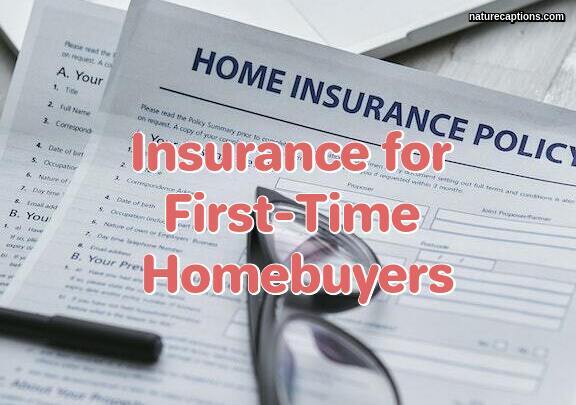Congratulations on purchasing your first home! As a first-time homebuyer, it’s important to protect your investment with the right insurance coverage. Here is a full guide to help you find the best insurance for your new home:
Understand the Different Types of Home Insurance:
Homeowners insurance is a type of insurance that covers damage or loss to your home and personal belongings. There are several types of coverage options, including:
- Dwelling Coverage: Covers damage to the structure of your home, including the roof, walls, floors, and foundation.
- Personal Property Coverage: Covers damage or loss to your personal belongings, such as furniture, electronics, and clothing.
- Liability Coverage: Protects you if someone is injured on your property and sues you for damages.
- Additional Living Expenses (ALE) Coverage: Covers expenses you incur if you need to temporarily move out of your home due to a covered loss, such as hotel costs and meals.
Consider the Location and Risk Factors:
The location of your home can affect the cost of insurance coverage. For example, if you live in an area that is prone to natural disasters like floods, earthquakes, or hurricanes, you may need additional coverage.

In addition, if you live in an area with a high crime rate, your insurance premiums may be higher.
Shop Around for Insurance:
It’s important to shop around and compare insurance policies from multiple providers to find the best coverage and rates for your needs.
Consider reaching out to an independent insurance agent who can help you compare policies and provide guidance on the best coverage for your specific needs.
Check the Company’s Financial Stability:
Make sure to choose an insurance company with a strong financial rating, as this can give you peace of mind that the company can pay out claims if needed.
You can check the financial rating of insurance companies by looking at independent ratings agencies like A.M. Best, Moody’s, or Standard & Poor’s.
Understand the Policy Exclusions:
Make sure to carefully review the policy exclusions to understand what is not covered by the insurance policy.
This can include things like damage from earthquakes or floods, or damage caused by your own negligence.
Consider Bundling Your Insurance:
Many insurance companies offer discounts if you bundle multiple policies, such as homeowners insurance and auto insurance.
Consider bundling your insurance to save money on premiums.
Choose the Right Coverage Amount:
Make sure to choose a coverage amount that is appropriate for the value of your home and personal belongings.
Under-insuring your home can leave you vulnerable to significant losses if a covered event occurs.
Understand the Deductible:
The deductible is the amount you’ll have to pay out of pocket before your insurance coverage kicks in. Make sure to choose a deductible amount that you can afford in the event of a covered loss.
Consider Additional Coverage Options:
Depending on your needs, you may want to consider additional coverage options, such as:
- Flood Insurance: Standard homeowners insurance policies do not cover flood damage, so you may need to purchase a separate flood insurance policy.
- Earthquake Insurance: If you live in an area that is prone to earthquakes, you may want to consider adding earthquake insurance to your policy.
- Umbrella Insurance: Umbrella insurance provides additional liability coverage beyond the limits of your homeowners insurance policy.
Review and Update Your Policy Annually:
Make sure to review your insurance policy annually to ensure that your coverage still meets your needs.
If you make significant renovations or upgrades to your home, you may need to update your coverage accordingly.
Ask for Discounts:
Many insurance providers offer discounts to homeowners, so make sure to ask about any available discounts.
For example, you may be eligible for a discount if you have a security system or if you have multiple policies with the same provider.
Understand the Claims Process:
Make sure to understand the claims process and how to file a claim if you experience a covered loss.
Knowing what to do in advance can make the claims process go more smoothly and minimize stress.
Consider the Reputation of the Insurance Provider:
In addition to checking the financial stability of the insurance company, it’s also important to consider the reputation of the company.
Look for reviews and ratings from customers to get an idea of how the company handles claims and customer service.
Consider Liability Limits:
Liability coverage is an important component of homeowners insurance, as it can protect you if someone is injured on your property and sues you for damages.

Make sure to choose liability limits that are appropriate for your needs.
Understand Replacement Cost vs. Actual Cash Value:
When choosing homeowners insurance, you’ll need to decide whether to insure your home for its replacement cost or its actual cash value.
Replacement cost coverage will pay for the cost of rebuilding your home, while actual cash value coverage will pay the current market value of your home, taking into account depreciation.
Make sure to understand the difference between these options and choose the coverage that is best for your needs.
Conclusion
In conclusion, as a first-time homebuyer, it’s important to protect your investment with the right insurance coverage.
Understanding the different types of coverage options, shopping around for insurance, considering risk factors and location, and choosing appropriate coverage amounts, deductibles, and liability limits can help you find the best insurance for your needs.
Additionally, considering additional coverage options, reviewing and updating your policy annually, and understanding the claims process can help you minimize stress and protect your investment in the event of a covered loss. With careful consideration and guidance from an independent insurance agent, you can find the best insurance coverage to protect your first home.